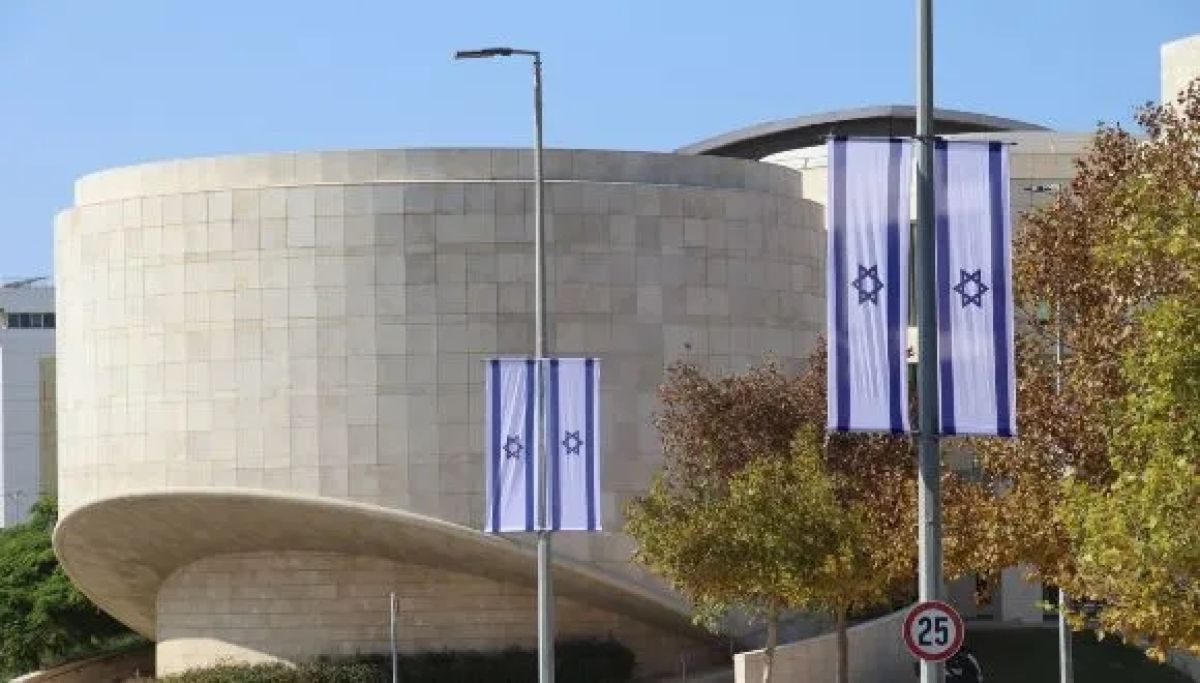45 Days into the War — An Update from the TAU President
The challenges awaiting us in the near and more distant future.
Nov. 20, 2023
Dear staff and faculty members, students, alumni and friends of TAU,
Time passes, yet our grief over the calamity of October 7 refuses to fade. Every day we learn more about the atrocities committed by the Hamas murderers and about the bravery of women and men who risked their lives to save others. The events of that cursed Shabbat remain excruciatingly real. To these we add the pain over the loss of our finest sons and daughters in the ongoing war, intermingled with the tormenting worry about those who have been kidnapped. Sometimes it seems that our hearts simply cannot contain so much sorrow and pain.
But as the war goes on, we have no choice but to adapt our daily lives to a “wartime routine,” and, perhaps even more important, to prepare for the future. This is our reality here in Israel and Tel Aviv University is no exception. About a week ago a report on volunteering on campus was sent out to the TAU community. For details please see the TAU website. If you have not volunteered so far, please consider options here. We recently adopted a school from Kiryat Shmona in the north, with hundreds of students, and they are now studying on our campus. We are also assisting Sapir College which, since it is located near the border with Gaza, suffered enormous losses in the massacre. We adopted preschools, invited evacuees to reside in our dormitories, and much more.
In this letter I would like to list some of the challenges awaiting us in the near and more distant future. Most are shared by all academic institutions in Israel, and some are broad national challenges in which academia has a stake.
Reservists. We have a profound obligation to support thousands of TAU students now serving in the IDF reserves. We have raised donations to help them now, in this difficult hour, and also when they return and resume their studies. For details please click here. The university, under the leadership of the Rector and Deans, is also getting ready to provide them with any needed academic assistance once the academic year begins. We call upon our faculty members to contribute to this effort by volunteering to teach beyond their regular hours. The Rector and I, together with many other faculty members, have already announced that we will do so.
Relations between Jews and Arabs. A major concern as we prepare for resuming studies is the tension between Jews and Arabs on campus. Needless to say, Arab Israelis had nothing to do with the horrors of October 7 – no more than any other Israeli citizen. But despite this obvious truth, a number of opportunists are using the situation to spread venom and hatred against Arabs. Speaking with faculty members and students from both sectors, I found that some of the Jews fear Arabs, while some of the Arabs fear Jews. Some Arabs told me that they avoid using public transportation and speaking Arabic in public, for fear of being harassed or even attacked. Such a destabilization of the already delicate relations between Jews and Arabs is not only an injustice to all citizens of Israel, but a real strategic threat to our future. The Israeli government must assume responsibility for this problem and rebuild trust among all citizens.
As we prepare to resume studies on campus, we must make the necessary plans to ensure the personal safety of all members of the TAU community – Jews and Arabs, on campus and in the dormitories. TAU’s VP for Equity, Diversity and Community, the Dean of Students, and unit heads are working together to preempt any tensions that might erupt on campus. We will spare no effort to make sure that each and every member of our community feels safe at TAU. This is our common home, shared by all. The management and all members of the TAU community have a responsibility to keep it safe and peaceful.
This last matter also has to do with freedom of expression. Democracy is not suspended in wartime. If anything, its importance increases. Therefore, freedom of expression will continue to be upheld so long as it does not involve any imminent danger of violence or incitement. But beyond this basic rule, we need to maintain an unaggressive atmosphere on campus and to keep peace in our home; let us all refrain from saying or doing anything – even if supposedly permissible – that might exacerbate tensions. At this time especially, let us be sensitive toward one another.
The independence of academic institutions. The independence of academia is the lifeblood of democracy. But even now, as the war rages, we see attempts to undermine this independence, to supposedly “restore order” to the academic institutions. We, the Heads of Israeli Universities, are on our guard in this respect as well.
Budget. War is a costly affair and will probably lead to substantial cuts in the budgets of the government’s ministries. Funding for higher education might be reduced. In addition, we do not yet know how the war will affect donations to scholarships and research when many donors may prefer to support Israel’s most urgent, frontline needs. I call on both the government and our TAU supporters to understand that Israel’s universities are not a peacetime luxury but a key and central component of the country’s most critical foundations: the economy, technology, medical capabilities, security, education, and culture.
Threats to democracy. As we all remember, this war was preceded by a deep crisis in Israeli society. Right now, at least at first sight, the crisis seems to be over, and unity is the order of the day. We all hope that this unity is here to stay, but there is no guarantee. In fact, some occurrences are greatly disturbing in this respect. First, we have recently seen attempts to limit the public’s freedom of speech and right to protest. Second, violent acts perpetrated by Jewish extremists against Palestinians in Judea and Samaria are not treated with suitable firmness. Third, we see extensive efforts to hand out firearms to large segments of the population, under the pretext that this is a lesson learned from the events of October 7. It is doubtful whether the enormous risks of widespread possession of firearms by civilians (such as shooting accidents due to unprofessional handling, and criminals gaining access to guns) have been seriously considered. One especially troubling concern is that, after the war, these firearms might make legitimate political disputes or demonstrations especially volatile and dangerous.
It is our duty to alert the public to these threats, even if its attention is now naturally focused on other matters.
These are just some of the challenges that Israeli academia will face in the coming months and years. We will all do everything in our power to overcome them.
Let us all hope for better days, for the swift return of the children, women and men kidnapped by Hamas, for the healing of the wounded in body and spirit, and for the success and safety of our soldiers.
Yours,
Ariel Porat


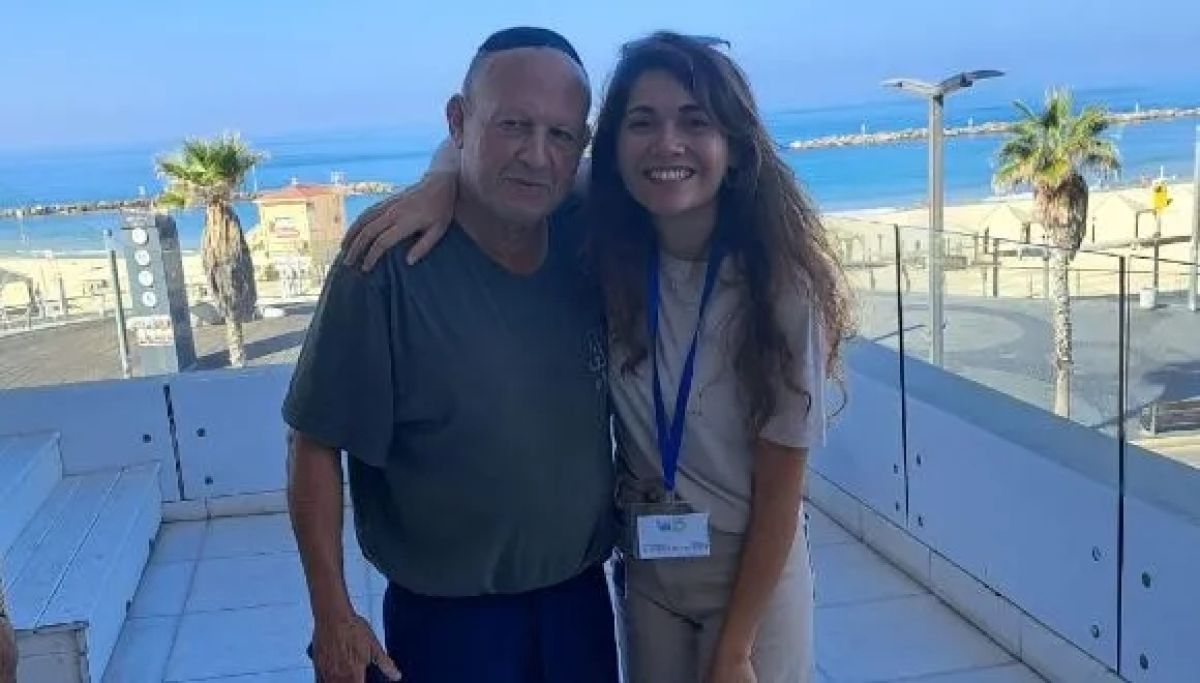
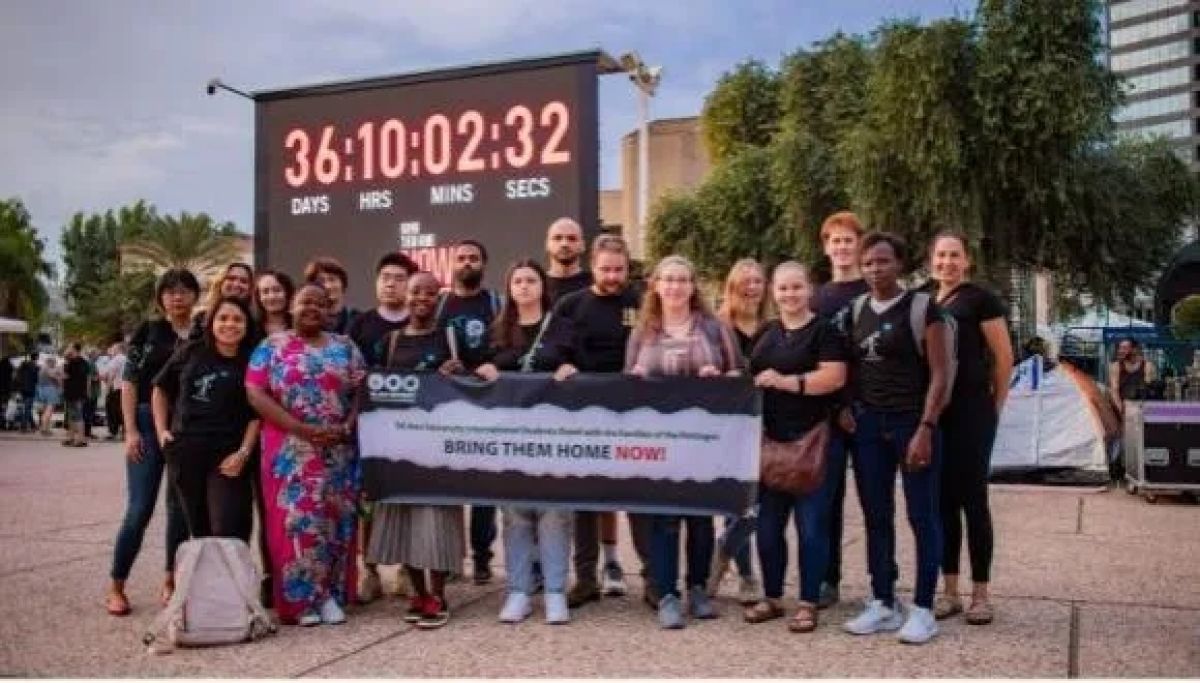
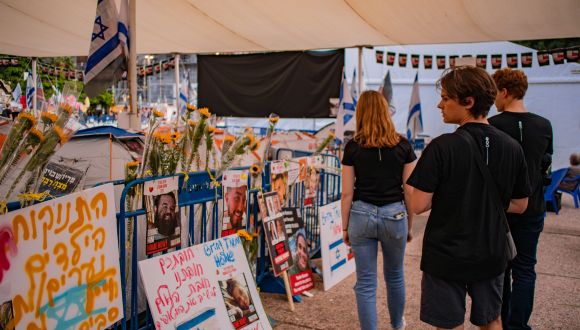 The Tel Aviv Museum plaza has effectively become the headquarters of the hostages’ families and is now dubbed the Hostage Square.
Some of the people at the plaza shared their harrowing stories with the students who came to show their solidarity and support for the kidnapped and their loved ones.
The Tel Aviv Museum plaza has effectively become the headquarters of the hostages’ families and is now dubbed the Hostage Square.
Some of the people at the plaza shared their harrowing stories with the students who came to show their solidarity and support for the kidnapped and their loved ones.
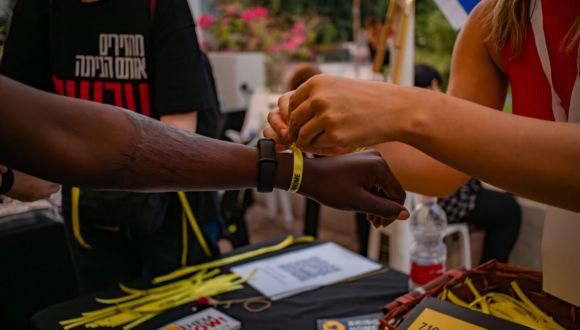 Itay Svirsky, originally from kibbutz Beeri, was visiting his parents at the kibbutz over the Sukkot holidays, as is customary in Israel. On Saturday morning, Itay was with his mother Orit in their safe room. Orit and her husband, Itay’s father, were murdered.
Itay was initially declared missing, but a couple of days later, the family received a notification from the IDF that he had been taken to Gaza.
Itay Svirsky, originally from kibbutz Beeri, was visiting his parents at the kibbutz over the Sukkot holidays, as is customary in Israel. On Saturday morning, Itay was with his mother Orit in their safe room. Orit and her husband, Itay’s father, were murdered.
Itay was initially declared missing, but a couple of days later, the family received a notification from the IDF that he had been taken to Gaza.
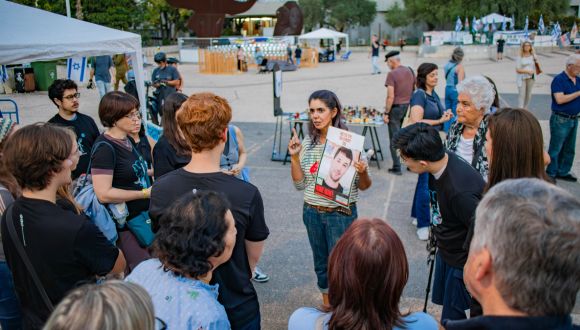 “We don’t know anything about his physical condition, but in the past two years, Itay has learned many tools that can help him treat himself and others.
“We don’t know anything about his physical condition, but in the past two years, Itay has learned many tools that can help him treat himself and others.
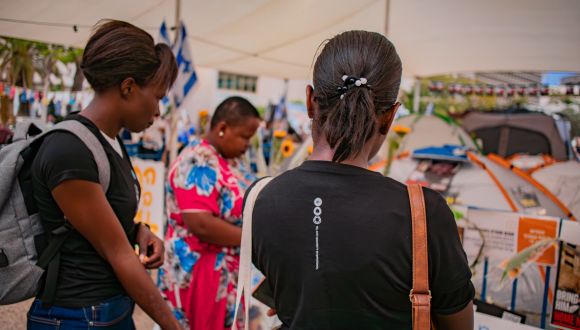 The neighbor of Adina Moshe, a 72-year-old hostage from Nir Oz, related the losses that their kibbutz had suffered, with about 70 people kidnapped and 30 more killed out of the population of 400.
“That’s a quarter of our population gone now. We still have no news and we hear nothing about the kidnapped. Terrorists dragged Adina through the window of the safe room after killing her husband. They put her on a motorcycle between themselves and took her to Gaza.
We don’t know what her condition is – she is not so healthy, she has a heart problem, and we don’t know if she’s getting any medicine or food, or if she is sleeping ok.
The neighbor of Adina Moshe, a 72-year-old hostage from Nir Oz, related the losses that their kibbutz had suffered, with about 70 people kidnapped and 30 more killed out of the population of 400.
“That’s a quarter of our population gone now. We still have no news and we hear nothing about the kidnapped. Terrorists dragged Adina through the window of the safe room after killing her husband. They put her on a motorcycle between themselves and took her to Gaza.
We don’t know what her condition is – she is not so healthy, she has a heart problem, and we don’t know if she’s getting any medicine or food, or if she is sleeping ok.
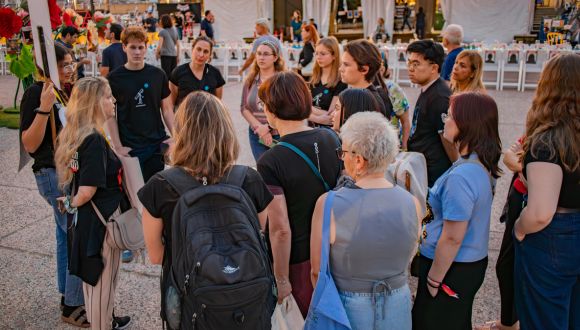 It was a moving experience for the students, and some stayed at the plaza until late evening to absorb it all and to join the relatives in their prayers and talks.
It was a moving experience for the students, and some stayed at the plaza until late evening to absorb it all and to join the relatives in their prayers and talks.
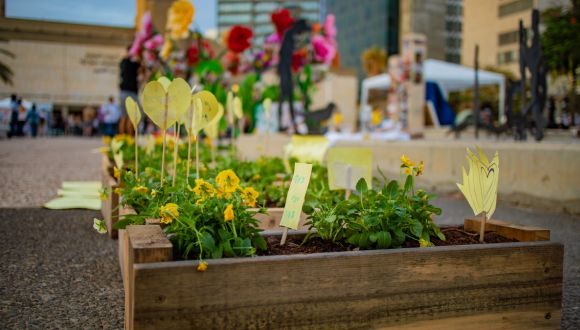



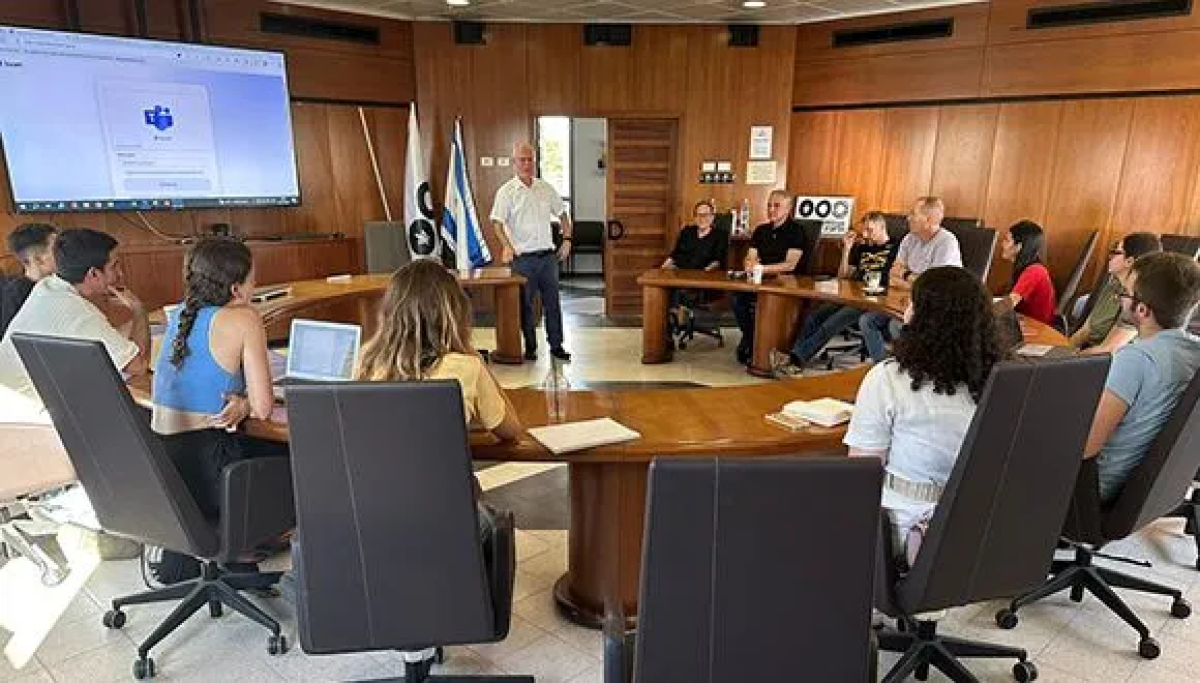
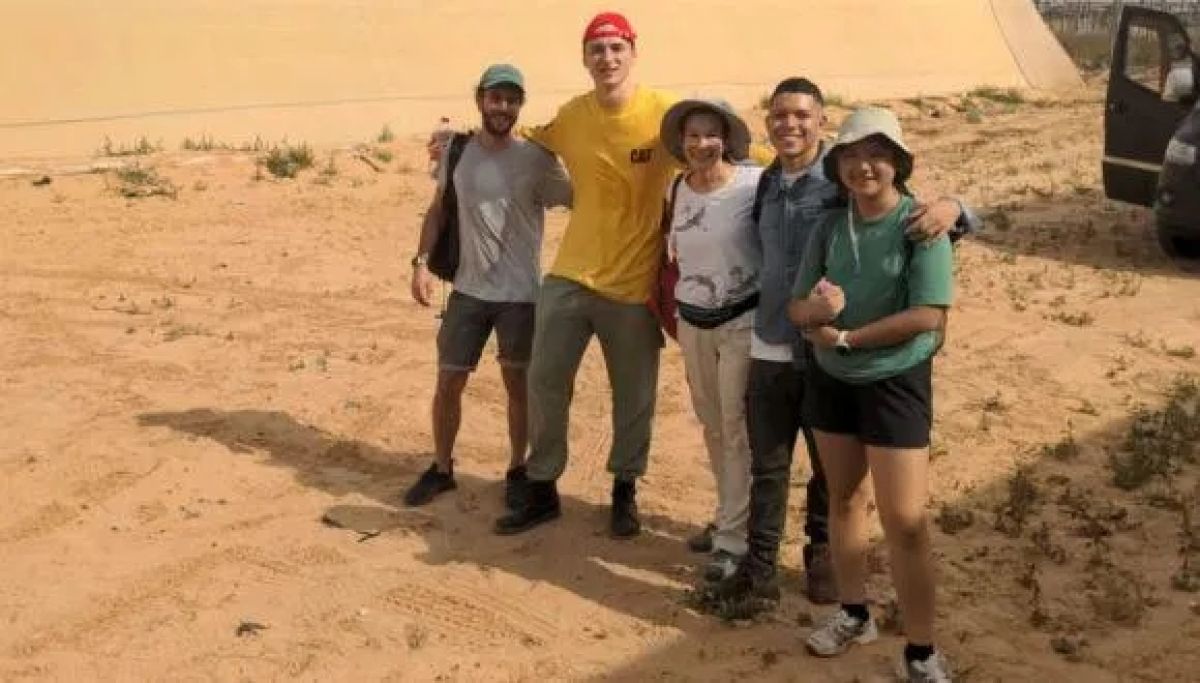
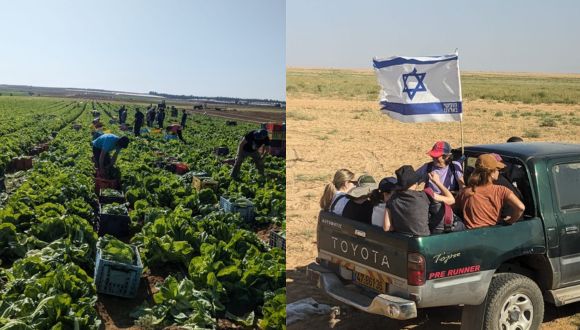 The initiative was started by Dr Anat Gafni and Prof. Ram Fishman who both teach on the international master’s program in
The initiative was started by Dr Anat Gafni and Prof. Ram Fishman who both teach on the international master’s program in 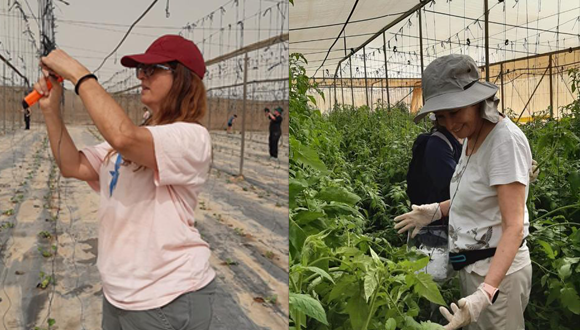 Dr. Gafni (right) at the farm
Dr. Gafni explains: “We left at 7 a.m. from the university and didn’t come back until 6 p.m. It was a whole day of hard work, but it was very rewarding because the family of the farmer lost one person who was killed in the attack, and they were happy to see us.” This week, several students will also work on one of the farms.
Dr. Gafni (right) at the farm
Dr. Gafni explains: “We left at 7 a.m. from the university and didn’t come back until 6 p.m. It was a whole day of hard work, but it was very rewarding because the family of the farmer lost one person who was killed in the attack, and they were happy to see us.” This week, several students will also work on one of the farms.
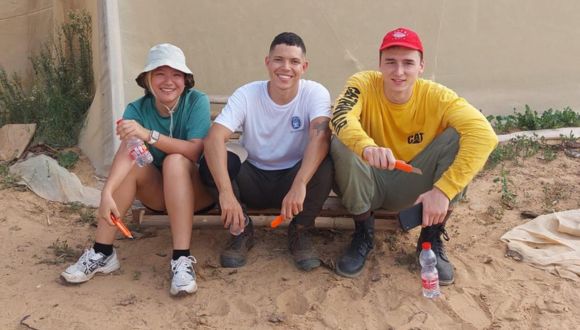 Jose Cristobal Padilla Arias (in the middle) with other international student volunteers
Jose Cristobal Padilla Arias, another student volunteer, shares his impressions:
“Before I came to Israel, I knew from my friends about volunteering in general. As for this particular initiative, I heard about it on the WhatsApp group we have for our program.
When we got to the farm, the owner put us into groups and explained what to do. I worked in a zucchini greenhouse, putting in trellises to support the plants and help them guide themselves up.
It was a very nice experience because I got to meet many new people. It also made me realize how important the sense of community is– with people working together for a common cause.
It’s a good way to acknowledge the hard work that agriculture involves, which makes you value it more. After all, agriculture is one of the fundamental elements of an economy– it provides us with food.”
Jose Cristobal Padilla Arias (in the middle) with other international student volunteers
Jose Cristobal Padilla Arias, another student volunteer, shares his impressions:
“Before I came to Israel, I knew from my friends about volunteering in general. As for this particular initiative, I heard about it on the WhatsApp group we have for our program.
When we got to the farm, the owner put us into groups and explained what to do. I worked in a zucchini greenhouse, putting in trellises to support the plants and help them guide themselves up.
It was a very nice experience because I got to meet many new people. It also made me realize how important the sense of community is– with people working together for a common cause.
It’s a good way to acknowledge the hard work that agriculture involves, which makes you value it more. After all, agriculture is one of the fundamental elements of an economy– it provides us with food.”
